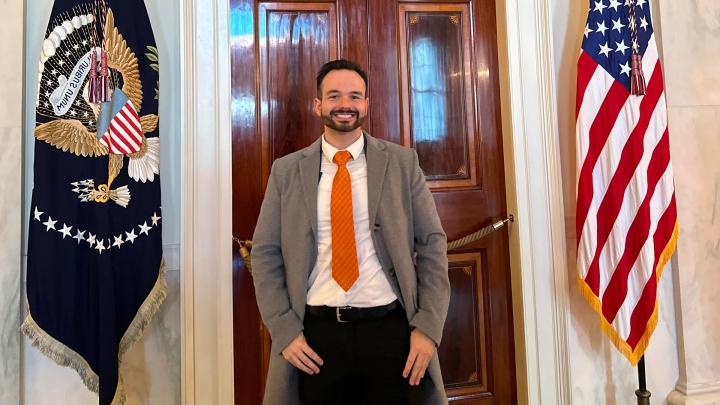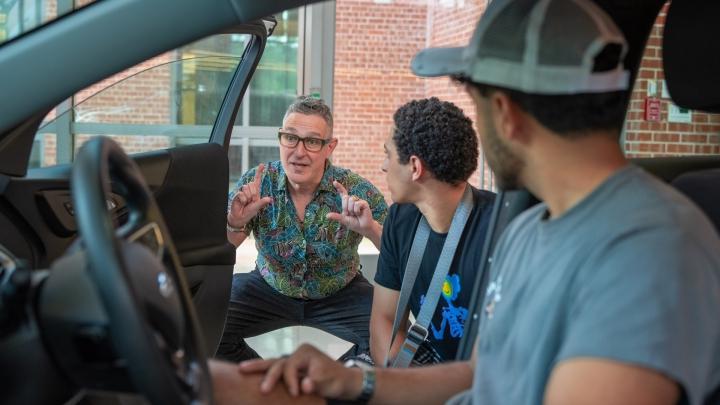
At Trinity University, 文科帮助我们导航一个不断变化的未来与全面的视角,跨越不同的学科和观点. Hear from four voices across campus about what excites, concerns, and inspires them about artificial intelligence.
Now, meet the Panelists.

KYLE GILLETTE ’01, PH.D.
Special Adviser to the Provost for Expression and Civil Discourse Author, longtime theater professor, and former acting dean of the humanities, Gillette is now charged with advancing civil discourse on big topics at Trinity.

RONNI GURA SADOVSKY, J.D., PH.D.
Philosophy
萨多夫斯基是一名社会规范研究者,他教授人工智能伦理课程.

BRITTON HORN ’09, PH.D.
Computer Science
Horn conducts research on game design, procedural content generation, and artificial intelligence in games.

ALTHEA DELWICHE, PH.D.
Communication
Delwiche, a longtime researcher into digital media, big data, political propaganda, and virtual worlds, has recently launched a lab studying media coverage of artificial intelligence.
Q: HOW IS ARTIFICIAL INTELLIGENCE (AI) CHANGING YOUR FIELD?
KG: I love that the advent of AI requires faculty to rethink the point of pedagogy for writing. Why does the act of writing matter? 如果你像大多数教师一样回答这个问题——学习写作就是学习思考——那么你必须开始更深入地探究写作的背景和利害关系. Computers can generate certain kinds of generic texts quickly and
without grammatical errors. But they can’t interrogate or unpack or anticipate other minds; they can’t think associatively or metaphorically.
从这个意义上说,人工智能对写作的威胁并不比摄影的发明对绘画的威胁更大. Photography didn’t make painting obsolete. It made it much, much more interesting. From impressionism and cubism to abstract expressionism, painters reimagined the medium and emphasized the subjective, human basis of art.
The same thing will happen to writing. 如果大学不教人类像机器一样写作,就不必害怕像人类一样写作的机器. As President Beasley has put it, in a world of technologically-generated answers, the people who ask the most interesting questions make all the difference.
RS: 我看到的主要变化是哲学与更广阔世界之间关系的变化. Like many earlier technological revolutions, 这一问题引发了对哲学专业知识的新需求,并使人们认识到哲学的重要性. 哲学家可以帮助回答我们何时(如果有的话)应该将人工智能系统视为有知觉的问题, as holders of beliefs, or as partners in knowledge creation. 哲学家还可以帮助其他领域的实践者思考人工智能的具体应用(包括金融领域的高风险应用)所引发的伦理问题, criminal justice, medicine, and education. 许多哲学家一直在努力工作,试图回答这些问题,并帮助其他领域的从业者更清楚地调查他们自己的问题.
BH: AI techniques in my field have been used for decades. Even though there are numerous ways to generate content, 我的研究领域(游戏的程序内容生成)越来越关注使用AI生成游戏关卡等内容, music, and art. In teaching, 我发现,那些使用人工智能来帮助解决家庭作业的学生并没有完全理解他们在学习什么. Because of this, 我已经创建了更多的场景,在这些场景中,他们必须理解和跟踪我生成的代码,而不是自己从头开始创建代码.
AD: For the past 80 years, 传播学研究人员依靠一种被称为定量内容分析的方法来检测媒体内容的系统模式. 人工智能的兴起使大型语言模型辅助内容分析成为可能. This semester, 我正在和一个由本科生组成的跨学科团队合作,分析有关人工智能兴起的流行新闻文章.
On the teaching front, AI changes everything. We are being forced to rethink prompts and
expectations for all of our assignments and assessments. We should all be asking ourselves questions like, “Why are we asking our students to do this?以及“我们如何才能清楚地区分可以委托给人工智能的任务和必须反映人类技能和判断的任务。?”
Q: CAN YOU TELL US SOMETHING YOU LOVE AND SOMETHING YOU HATE ABOUT AI?
BH: 我很高兴人工智能让更多的人了解到计算机科学作为一个整体对高等教育和整个世界的影响. However, I hate that some people view computer science as only AI, even though there are a plethora of topics that AI does not begin to address.
AD: Generative AI tools such as GPT-4, Pi, Gemini, 当试图掌握任何新的探究领域时,克劳德可以作为互动导师. 人工智能模型是极好的创造性和战略性合作者,可以提出关于如何在复杂的研究项目背景下改进问题和方法的好建议. I love this about AI.
我讨厌这么多人把人工智能模型当作通用答题机来对待. Instead of iterating and guiding the AI model to more sophisticated and nuanced outputs, 许多人只是简单地接受模型的第一个答案,然后继续前进(相当于不加批判地点击第一个谷歌搜索结果)。.
RS: One thing I love about AI is, as I mentioned before, 它将人们引入哲学问题——关于语言和认知本质的问题, about values like privacy and fairness that we hope to preserve in our evolving institutions, or about the value of creative works that AI can now mimic.
In the context of higher education, one thing I hate about AI is that it tempts our students to avoid productive frustration. For high-achieving students like ours, 他们在上大学之前可能从未有过真正陷入困境或无可救药地迷失的经历.
这些经历是不愉快的,但它们对学习过程也非常重要. Students become self-confident problem-solvers by building up a tolerance for the feeling of being stuck; they need to discover for themselves that there are strategies for finding their way or getting unstuck, so that they don’t give up when they are utterly confounded by a hard problem in the future. But with ChatGPT offering them a way to avoid that frustration, 对于我们这些教师来说,创造能够促进这种学习的作业是非常具有挑战性的.
问:你认为人工智能会影响赌博娱乐平台网址大全师生跨学科合作和发现的方式吗? WHAT DOES AI MEAN FOR THE FUTURE OF THE LIBERAL ARTS IN GENERAL?
AD: 人工智能和文科就像花生酱和巧克力:两种很棒的味道搭配在一起很好. 人工智能最令人兴奋的元素之一是,它扩大了我们对如何编写计算机程序的理解,并邀请文科专业的学生参与机构设计, train, and deploy new AI systems. In fact, our students are uniquely well-prepared to participate in these conversations.
RS: 人工智能带来了复杂的伦理和政治问题,这些问题超越了我们传统的学科划分. 如果我们允许学科界限限制我们的思维,我们将无法在这些问题上取得进展. So, 我希望这项新技术能给我们带来跨学科合作的机会.


